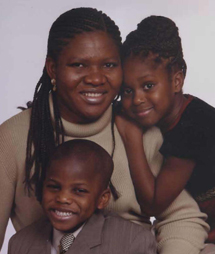
Handy Links
SLAC News Center
SLAC Today
- Subscribe
- Archives: Feb 2006-May 20, 2011
- Archives: May 23, 2011 and later
- Submit Feedback or Story Ideas
- About SLAC Today
SLAC News
Lab News
- Interactions
- Lightsources.org
- ILC NewsLine
- Int'l Science Grid This Week
- Fermilab Today
- Berkeley Lab News
- @brookhaven TODAY
- DOE Pulse
- CERN Courier
- DESY inForm
- US / LHC
SLAC Links
- Emergency
- Safety
- Policy Repository
- Site Entry Form

- Site Maps
- M & O Review
- Computing Status & Calendar
- SLAC Colloquium
- SLACspeak
- SLACspace
- SLAC Logo
- Café Menu
- Flea Market
- Web E-mail
- Marguerite Shuttle
- Discount Commuter Passes
-
Award Reporting Form
- SPIRES
- SciDoc
- Activity Groups
- Library
Stanford
Around the Bay
Peace Esonwune
 Peace Esonwune has a busy schedule. Between pursuing a graduate degree, taking care of her two children and doing research at the Stanford Synchrotron Radiation Laboratory (SSRL) as a Graduate Degrees for Minorities in Engineering and Science (GEM) Fellowship Summer Intern, she also makes time to volunteer as a mentor for
young people. "No matter how busy I am, I try to prioritize that," she says. "I've mentored students who say school is not for them. They're just barely making it in high school. With a mentor you see them finish high school, go to college, do something with their lives. It's very inspiring."
Peace Esonwune has a busy schedule. Between pursuing a graduate degree, taking care of her two children and doing research at the Stanford Synchrotron Radiation Laboratory (SSRL) as a Graduate Degrees for Minorities in Engineering and Science (GEM) Fellowship Summer Intern, she also makes time to volunteer as a mentor for
young people. "No matter how busy I am, I try to prioritize that," she says. "I've mentored students who say school is not for them. They're just barely making it in high school. With a mentor you see them finish high school, go to college, do something with their lives. It's very inspiring."
Esonwune volunteers as a science and math tutor for high school students, and in her children's science and math classes. She says that with a mentor in her own life, she might have navigated the American educational system better upon her arrival in the U.S.
Esonwune immigrated from Nigeria in 1996, when she was almost finished with her undergraduate studies. But it wasn't until many years later that she pursued and completed an undergraduate degree, a Bachelor of Science in electrical engineering and computer science from U.C. Berkeley. "It is important for recent immigrants to be mentored, so they can get into school and complete their education in order to thrive while in the U.S. and in life," she says.
She says that the most important mentor in her own life was her mother. "My mom mentored me in many ways," she recalls. "She wasn't able to get a formal education in her time. She tried, but couldn't. I think she vowed to herself that her kids would attain the highest level of academic training that they aspired to. She followed through on that vow with a lot of selfless sacrifices. She encouraged and inspired me."
In Nigeria, girls have not always been allowed to pursue an education, and this has driven Esonwune's wish to help young girls in particular. "I want to tell younger kids in Nigeria, especially girls, that anything is possible if you work hard," she remarks. "I also want to show them that education is one of the main doorways to a successful career."
At SSRL, Esonwune herself is mentored by her supervisor, Herb Axelrod. Working with the Structural Molecular Biology (SMB) group at SSRL, Esonwune uses protein crystallization and X-ray diffraction to determine the structure and function of vital protein targets. "Most importantly, I participate in and contribute to the work of a great research team under the mentorship of Dr. Herbert Axelrod, who makes my strenuous commute very worthwhile,” she says happily. "I look forward to coming to SLAC every morning to work for Herb."
Peace Esonwune says she would like to return to Nigeria more often, once she completes her doctoral study in bioengineering (or biomedical engineering). She still has family there, and would like to be involved with the African Institute of Science and Technology and innovative biomedical technology projects. Ideally, she would like to use her research—involving drug delivery techniques—to find more efficient delivery devices for drugs that treat the malaria parasite—a major health issue in countries like Nigeria.
—Calla Cofield, SLAC Today, July 23, 2008